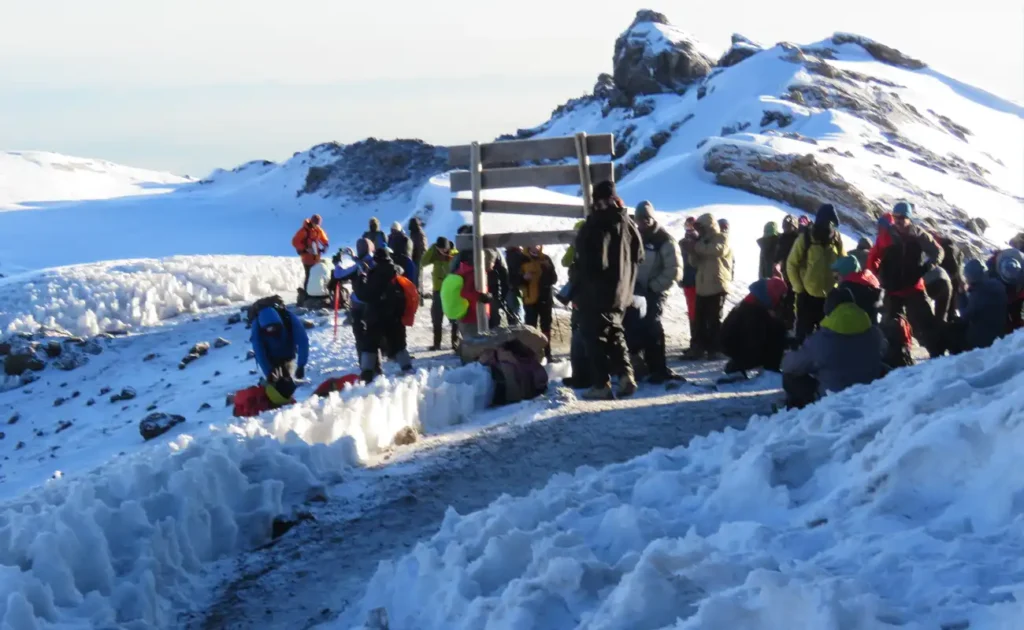Over 1.5 million tourists visit Tanzania annually, with many traveling to enjoy eco-friendly safaris. Eco-conscious travel isn’t just a trend—it’s a necessity to preserve the delicate ecosystems of iconic destinations like the Serengeti. Travelers are now seeking sustainable ways to experience nature without leaving a negative impact.
Sustainable travel in Tanzania involves careful planning. Choosing eco-friendly accommodations, such as lodges that use solar power and conserve water, is one significant step. Additionally, visitors can support local communities by hiring local guides and purchasing locally made products, which help reduce the carbon footprint and boost the local economy.

Eco-Friendly Tanzania Safari: Sustainable Travel Tips
Travelers visiting Tanzania can start their eco-friendly journey by selecting sustainable accommodations. Many lodges and camps in Tanzania are now committed to reducing their environmental impact. They incorporate renewable energy sources like solar power and harvest rainwater for use. Some even provide eco-friendly toiletries to reduce waste. By choosing these lodges, tourists can minimize their carbon footprint.
Supporting local communities is a vital aspect of sustainable travel. Hiring local guides not only enriches the experience with their extensive knowledge but also supports the local economy. Tourists can also buy handcrafted items directly from artisans. This encourages fair trade and preserves traditional crafts. Additionally, dining at local restaurants helps the community thrive.
Practicing low-impact safari techniques is crucial to protecting wildlife and landscapes. Stay on designated paths to avoid disturbing the natural habitat. Avoid using plastic bottles; instead, carry reusable water bottles. Tourists should use binoculars for a closer look rather than approaching animals. This ensures minimal disruption to wildlife. Making small changes can have a significant positive impact.
Exploring eco-friendly activities adds value to the safari experience. Visitors can participate in conservation projects, like tree planting or wildlife monitoring. Enjoy guided walking safaris to experience nature up close without contributing to carbon emissions. Educative tours in national parks and reserves provide knowledge about conservation efforts. Lastly, visiting eco-friendly attractions, such as butterfly farms and community-run wildlife sanctuaries, supports sustainable tourism. These engaging activities enhance the overall travel experience while promoting environmental responsibility.
Importance of Eco-Friendly Travel to Tanzania
Eco-friendly travel plays a key role in preserving Tanzania’s natural landscapes. By adopting sustainable tourism practices, travelers help protect vital ecosystems like the Serengeti. This includes preserving habitats for endangered species such as black rhinos and African elephants. With less pollution and waste, these animals thrive in a cleaner, healthier environment. Moreover, protecting these species ensures biodiversity, which is vital for a balanced ecosystem.
Engaging in sustainable travel boosts local communities economically. When tourists choose to support local businesses, it leads to job creation and growth. This includes hiring local guides, buying from regional markets, and staying at community-run lodges. Such support can lift people out of poverty, providing better opportunities for education and healthcare. As a result, these communities can sustain themselves without over-exploiting natural resources.
Eco-friendly travel also enhances cultural preservation. Travelers experience authentic traditions when they interact with local communities. This enriches their journey and fosters mutual respect. Tourists learn about traditional crafts and dances, which are protected and passed down through generations. Cultural exchanges like these promote understanding and appreciation.
Tanzania’s reputation benefits significantly from eco-friendly tourism. Tourists sharing positive experiences encourage others to visit responsibly. As more people embrace sustainable travel, Tanzania becomes a model for environmental preservation. This boosts international recognition and ensures a steady flow of visitors. By promoting responsible tourism, Tanzania maintains its beauty for future generations.
Choosing Sustainable Accommodations in Tanzania
When selecting accommodations in Tanzania, it’s important to choose those that prioritize sustainability. Eco-friendly lodges use renewable energy sources like solar and wind power. This reduces their reliance on fossil fuels and lowers carbon emissions. Additionally, many lodges implement water conservation practices, such as rainwater harvesting. These efforts help preserve the environment.
Sustainable accommodations in Tanzania often adopt waste management practices. This includes recycling programs and composting organic waste. Reducing plastic use is also a common practice, with many lodges providing guests with reusable water bottles. These actions significantly reduce the amount of waste that ends up in landfills. By minimizing waste, lodges help protect natural areas from pollution.
Supporting local communities is another key aspect of sustainable accommodations. Many eco-lodges source their food locally, promoting farm-to-table dining. This not only provides fresher meals for guests but also supports local farmers. Employing local staff helps create jobs and stimulate the economy. Guests can feel good knowing their stay benefits the surrounding community.
Guests can look for certifications to ensure their accommodations are truly eco-friendly. Organizations like the Global Sustainable Tourism Council (GSTC) provide standards for sustainability. Certified lodges meet strict environmental and social criteria. Choosing such accommodations guarantees a commitment to sustainable practices. This not only enhances the travel experience but also supports responsible tourism.
Supporting Local Communities While Traveling
When traveling, supporting local communities can make a huge difference. Tourists can impact local economies positively by spending money where it matters most. This includes buying handmade crafts and souvenirs directly from artisans. Visitors can enjoy authentic meals at local restaurants, offering a true taste of the region’s culture. Making these choices helps create jobs and improve people’s lives.
Choosing local guides for tours enhances the travel experience and supports the community. Local guides have in-depth knowledge of their area, offering unique insights that enrich the journey. They can introduce travelers to hidden gems that tourists might otherwise miss. Guides’ earnings directly benefit their families and communities. Hiring them ensures that tourism dollars circulate locally.
Participating in community-led projects provides visitors with meaningful travel experiences. Tourists can volunteer in conservation projects or educational initiatives. These activities allow travelers to give back in a lasting way. Helping plant trees or build schools not only benefits the community but also leaves a positive mark on the visitor. This involvement fosters connections that transcend cultural differences.
Travelers can choose accommodations that prioritize local involvement. Many eco-lodges employ staff from nearby communities and source local products. These lodges work closely with residents, creating mutual benefits. By staying at such places, tourists support a sustainable tourism model. This approach leads to more equitable development.
Visitors should educate themselves on cultural norms and practices before exploring new places. Respecting local traditions shows appreciation and understanding. Learning a few basic phrases in the local language can create warm connections. Observing cultural etiquette fosters respectful interactions. These small gestures enhance the travel experience and support harmonious relationships.
Low-Impact Safari Practices
Practicing low-impact safari techniques is essential for preserving Tanzania’s natural beauty. One effective approach is staying on designated paths during game drives. By doing so, tourists help protect delicate vegetation and reduce habitat disturbance. It’s also important to adhere to park rules and regulations to prevent environmental harm. These actions ensure the longevity of Tanzania’s unique landscapes.
Using eco-friendly transportation options can greatly reduce a safari’s carbon footprint. Consider choosing providers that offer electric or hybrid safari vehicles. This minimizes emissions and limits pollution. Travelers can also opt for walking safaris where available, offering an up-close and personal experience with nature. These small steps contribute significantly to environmental conservation.
- Avoid Littering: Always carry a reusable bag for trash.
- Limit Noise: Speak softly to prevent scaring wildlife.
- Respect Wildlife: Observe animals from a distance and never feed them.
- Use Biodegradable Products: Choose eco-friendly sunscreens and insect repellents.
Supporting safari operators who promote sustainable practices is another way to lessen environmental impact. These operators engage in conservation efforts, like anti-poaching initiatives and wildlife monitoring. They also educate tourists about the importance of environmental stewardship. By choosing responsible operators, tourists can make a positive difference. This support helps fund crucial conservation projects.
Visitors should be mindful of their energy and water use while staying in safari lodges. Turning off lights and air conditioning when leaving a room conserves resources. Taking quick showers and reusing towels can significantly cut water waste. Lodges often provide opportunities for guests to learn more about sustainability. Participating in these educational programs enhances both awareness and enjoyment of the trip.
Eco-friendly Activities and Attractions in Tanzania
Tanzania offers a range of eco-friendly activities that allow tourists to enjoy nature while respecting the environment. Hiking Mount Kilimanjaro is a popular choice, offering breathtaking views and a sense of adventure. Travelers can join guided tours ensuring minimal impact on this magnificent mountain. Enhancing this experience, visitors learn about local flora and fauna from knowledgeable guides. Such treks encourage responsible exploration and appreciation of nature.
For animal lovers, visiting community-run wildlife sanctuaries provides an ethical way to see Tanzania’s incredible wildlife. These sanctuaries often rescue injured or orphaned animals, giving them a safe home. Tourists can observe animals up close and learn about conservation efforts. This interaction supports ongoing work to protect wildlife. By visiting these sanctuaries, travelers directly contribute to conservation initiatives.
- Explore Coffee Plantations: Discover sustainable farming practices.
- Bird Watching: Observe rare species in their natural habitats.
- Engage in Cultural Tours: Experience Maasai traditions and art.
- Sail on a Dhow: Enjoy traditional wooden sailing vessels on Zanzibar’s coast.
Participating in conservation projects is another rewarding activity for visitors. Projects might involve tree planting or beach clean-ups. These activities not only help the environment but also engage visitors in meaningful ways. It offers a unique chance to work alongside locals towards common goals. Participants leave with a deeper understanding of the challenges and rewards of conservation work.
National parks in Tanzania also offer eco-friendly visits, focusing on both education and enjoyment. The Serengeti, for example, provides eco-tours that spotlight wildlife conservation. Guided walking tours deliver an immersive experience without disturbing the environment. These tours educate travelers about the park’s ecosystems and conservation strategies. Enjoying nature responsibly not only benefits travelers but also the beautiful landscapes they visit.
Key Takeaways
- Stay at lodges using renewable energy sources.
- Hire local guides to support the community economy.
- Engage in conservation activities like tree planting.
- Follow low-impact safari practices for environmental protection.
- Choose accommodation that prioritizes sustainability and eco-friendly practices.



